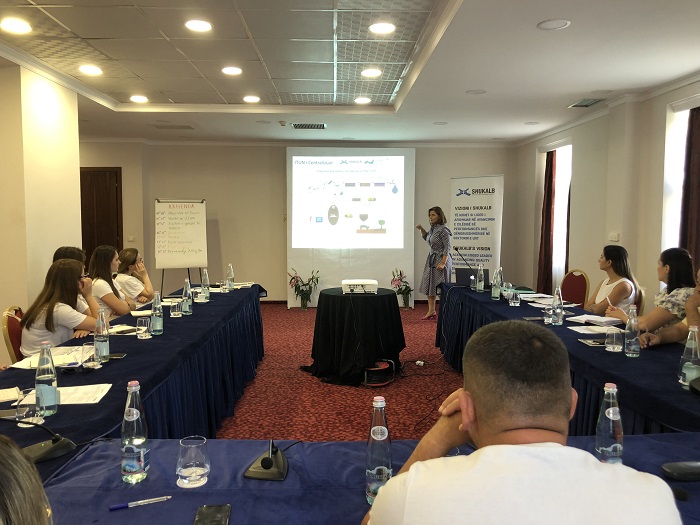An innovative two-day workshop focusing on Wastewaster Managemement in the context of Circular Economy was organised by the Water Supply and Sewage Association of Albania SHUKALB and GWP-Med in Albania in July. Its overall aim was to train participants from the water supply and sanitation sector on the benefits of wastewater management in the context of circular economy.
The workshop's first day took place in Tirana while the following day participants visited the WasteWater Treatment Plant in Durres, the only WWTP in Albania that produces biogas, which can be used for producing electrical energy. During the field visit, they had the opportunity to deepen their understanding of the potential means of resources recovery after the treatment of wastewater and WWTP's contribution in circular economy.
In Albania, both issues are still at quite early stages. The first wastewater treatment plant (WWTP) in Albania started operating in 2006 and today the country has 12 WWTPs, serving to around 13 % of the population. In most of them, the treated effluent is simply discharged in the receiving water bodies, as the final result of a long process of treatment that consumes substantial amounts of energy and chemicals. At the same time, there are few good examples that have started integrating circular economy concepts as part of their wastewater management, such as the WWTPs in Korca and in Durres.
Participants included different stakeholder representatives from local and central government, representing water and wastewater utilities, municipalities, environmental protection agencies, water resources management agencies, regulatory bodies, as well as line ministries and agencies in charge of water and wastewater infrastructure. They engaged in fruitful discussions and group exercises and also visited a Waste Water Treatment Plant facility.
The workshop was organised in 6 modules as described below:
Module 0: Welcoming and Context
- Workshop Agenda
- Objectives of the workshop
- Ground rules
- Pre-Assessment participants’ results
- Participant’s expectations
- Introduction of participants
Module 1: What Is Circular Economy?
This module was the introductory module around the theme of the workshop, and it included the following topics:
- Diagrams: Linear and Circular Economy
- Why do we need Circular Economy
- Circular Economy Principles
Module 2: Legal and Policy Framework
This module focused on the legal and policy framework at the EU and national levels. The module addressed:
- International Context
- National Context
- Relevant institutions in Albania
Module 3: Business Value in a Circular Economy
The module addressed in more detail the following:
- Drivers Towards a Circular Economy
- Closing the Loop
- Value Creation in a Circular Economy
- Five Key Circular Business Models
- Examples
Module 4: Wastewater and its treatment in the context of the Circular Economy
Chapters included:
- Targeting recovery of resources from wastewater
- Embracing the circular theory in wastewater treatment
- Wastewater optimization through integration
- Challenges with technologies and mind set
- Status of WWTP in Albania, and our approach towards circularity in sewage treatment
Module 5: Case studies of Wastewater Management in the Context of Circular Economy
This module included some international and national case studies on wastewater reclamation, sludge use in agriculture, as well as other biomass use and wastewater treatment.
Adopting Circular Economy practices in wastewater management is key for sustainable sanitation with benefits spreading across sectors: improved environmental status, capturing and reusing nutrients, lower energy and carbon footprint, integration of renewable energies.
The agenda and the presentations of the Workshop can be found in the top right corner of the article.
